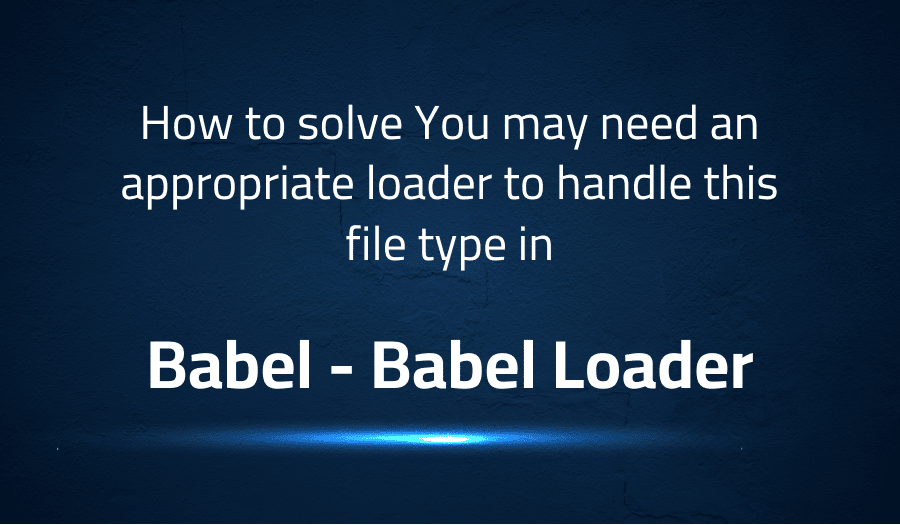

How to solve You may need an appropriate loader to handle this file type in Babel Babel Loader
Explanation of the problem
The following error occurred in the file “./node_modules/@angular/fire/messaging/messaging.js” at line 23, column 40: “Module parse failed: Unexpected token (23:40)”. This error may be caused by a lack of an appropriate loader to handle the file type.
The problematic code block in question is as follows:
var _this = this;
if (!isPlatformServer(platformId)) {
var requireMessaging = from(import('firebase/messaging'));
this.messaging = requireMessaging.pipe(map(function () { return _firebaseAppFactory(options, nameOrConfig); }), map(function (app) { return app.messaging(); }), runOutsideAngular(zone));
this.requestPermission = this.messaging.pipe(switchMap(function (messaging) { return messaging.requestPermission(); }), runOutsideAngular(zone));
}
It appears that the issue is related to the use of the “import” keyword within the “from” function call. This may indicate a compatibility issue with the current version of the project’s dependencies or a configuration error in the project’s build settings.
Troubleshooting with the Lightrun Developer Observability Platform
Getting a sense of what’s actually happening inside a live application is a frustrating experience, one that relies mostly on querying and observing whatever logs were written during development.
Lightrun is a Developer Observability Platform, allowing developers to add telemetry to live applications in real-time, on-demand, and right from the IDE.
- Instantly add logs to, set metrics in, and take snapshots of live applications
- Insights delivered straight to your IDE or CLI
- Works where you do: dev, QA, staging, CI/CD, and production
Start for free today
Problem solution for How to solve You may need an appropriate loader to handle this file type in Babel Babel Loader
To solve the error “You may need an appropriate loader to handle this file type” when using Babel and the Babel Loader, there are a few steps you can try:
- Make sure that you have installed the required dependencies for the Babel Loader. This includes babel-loader, @babel/core, and @babel/preset-env (or a different preset depending on your project’s needs).
- In your webpack config file, configure the babel-loader to use the correct preset(s) and options. An example of a basic configuration would look like this:
module: {
rules: [
{
test: /\.js$/,
exclude: /node_modules/,
use: {
loader: "babel-loader",
options: {
presets: ['@babel/preset-env']
}
}
}
]
}
- Check your .babelrc file, make sure it’s in the root of your project, and that it’s configured correctly.
- Check your package.json file to make sure that all dependencies are installed correctly.
- Make sure that the files being imported are in the correct file format.
- Make sure that the Loader is correctly configured in the webpack config file
- If you are using webpack version 4 or higher, try using the “module” property instead of the “loaders” property
- If you are using Webpack 5, make sure that you have set the “module” property in the webpack config file to “esnext”
- If you have tried all these steps and the error persists, please provide the webpack.config.js file and package.json file so that I can give you a more detailed solution.
Other popular problems with Babel Loader
Problem: Incorrect Babel Preset Configuration
One common problem with the Babel Loader is that the incorrect preset is being used in the webpack config file. This can cause issues with syntax or compatibility with certain modules.
Solution:
To solve this problem, make sure that the correct preset is being used in the webpack config file. For example, if you are using @babel/preset-env, you should configure it like this:
module: {
rules: [
{
test: /\.js$/,
exclude: /node_modules/,
use: {
loader: "babel-loader",
options: {
presets: ['@babel/preset-env']
}
}
}
]
}
Problem: Incompatibility with Webpack version
Another common issue is that the Babel Loader is not compatible with the version of webpack being used.
Solution:
To solve this problem, make sure that you are using the latest version of babel-loader and that it is compatible with the version of webpack you are using.
Problem: Incorrect use of .babelrc file
A third common problem is that the .babelrc file is not being used correctly. This can cause issues with syntax or compatibility with certain modules.
Solution:
To solve this problem, make sure that the .babelrc file is in the root of your project and that it is configured correctly. An example of a basic .babelrc file would look like this:
{
"presets": ["@babel/preset-env"]
}
It’s important to note that if you are configuring the options for babel-loader in your webpack config file, you should not use the .babelrc file.
It’s also important to note that if you are using webpack version 4 or higher, you should not use the .babelrc file to configure babel-loader, instead you should use the options property in the webpack config file.
A brief introduction to Babel Loader
The Babel Loader is a webpack module that allows developers to use the latest JavaScript features in older browsers by transpiling the code to an older version of JavaScript. Babel is a JavaScript compiler that is commonly used to transpile modern JavaScript code to an older version that can run on older browsers. The Babel Loader is the webpack module that integrates Babel into the webpack workflow, allowing developers to use the latest JavaScript features and still support older browsers.
The Babel Loader is configured in the webpack config file, where the developer can specify which presets and plugins should be used for transpilation. For example, the preset @babel/preset-env can be used to transpile the code to the version of JavaScript that is supported by the targeted browsers. Additionally, the options property in the webpack config file can be used to configure the options for babel-loader. The configuration options include the ability to specify which files should be transpiled, which presets and plugins should be used, and the ability to set custom options for those presets and plugins.
Most popular use cases for Babel Loader
- Transpiling modern JavaScript code to older versions: One of the primary uses of the Babel Loader is to transpile modern JavaScript code to older versions that can run on older browsers. This allows developers to use the latest JavaScript features while still supporting older browsers. For example, the following code block uses the latest JavaScript syntax (let and const) but is transpiled by the Babel Loader to use the older var syntax:
let x = 5;
const y = 10;
console.log(x + y);
- Using JSX syntax with React: Another use of the Babel Loader is to allow developers to use JSX syntax with React. JSX is a syntax extension for JavaScript that allows developers to write HTML elements directly in their JavaScript code. The Babel Loader, with the help of the @babel/preset-react preset, can transpile JSX code to JavaScript, making it compatible with React.
- Using ECMAScript modules (ESM) in a CommonJS (CJS) environment: Babel Loader also allows you to use ECMAScript modules (ESM) in a CommonJS (CJS) environment. This means that you can use the import and export statements to manage your modules and dependencies in your project, even if some of the dependencies or runtime environments don’t support ESM. It will use the @babel/plugin-transform-modules-commonjs to convert ESM code to CJS.
It’s Really not that Complicated.
You can actually understand what’s going on inside your live applications.




